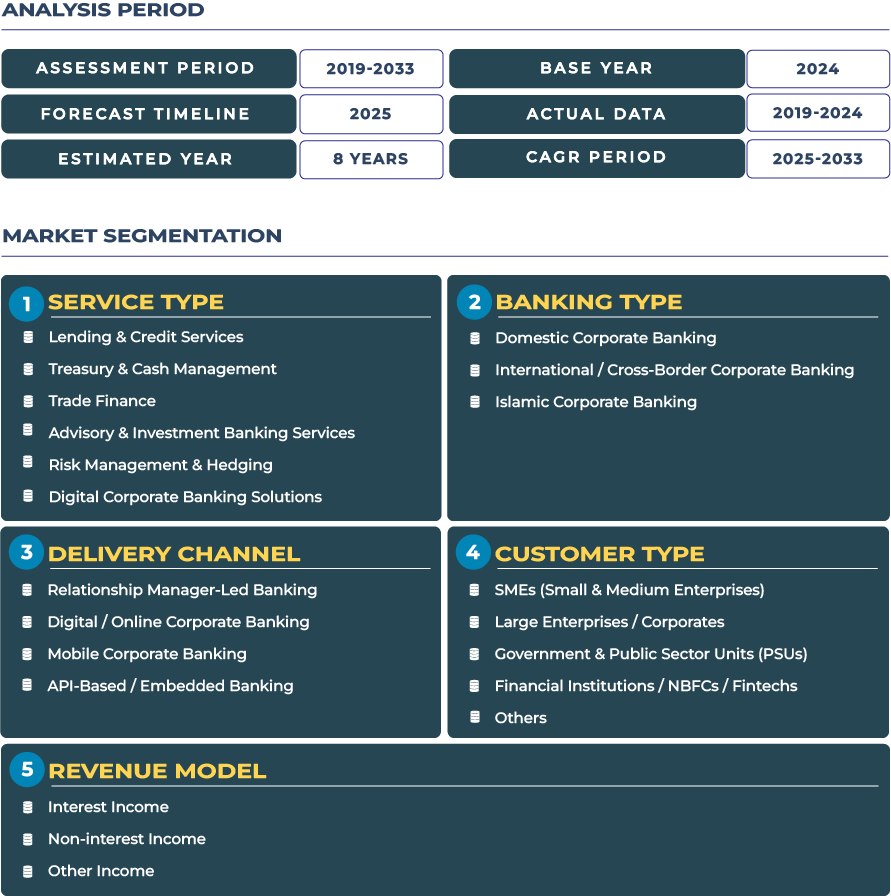Financial Hub Corporate Banking in Bahrain: Leveraging Regional Advantages for Enterprise Growth
Bahrain corporate banking market continues to stand as a key pillar of its diversified financial services ecosystem, benefiting from the country’s reputation as a well-regulated and innovation-driven financial hub. As the first Gulf state to liberalize its banking sector, Bahrain has successfully built an environment conducive to both domestic and regional corporate clients seeking efficient treasury management, trade finance, and advisory banking solutions. The Central Bank of Bahrain (CBB) plays a critical role in ensuring transparency, compliance, and operational stability across the sector.
Note:* The market size refers to the total revenue generated by banks through interest income, non-interest income, and other ancillary sources.
In 2025, the Bahrain Corporate Banking Market is estimated at USD 0.9 billion and projected to reach USD 0.9 billion by 2033. This slow yet steady growth reflects the nation’s measured approach to balancing traditional banking strengths with digital innovation and Islamic finance leadership. Despite limited domestic scale, Bahrain’s deep-rooted banking expertise, proximity to Saudi Arabia, and alignment with the Bahrain Economic Development Board’s financial sector strategy continue to position it as a bridge for regional corporate capital flows.
Strategic Corporate Banking Outlook: Balancing Innovation and Regional Connectivity
Bahrain’s strategic location and advanced banking regulations have transformed it into a corporate banking destination that links Gulf markets with international financial systems. The country’s banks are increasingly focusing on digital corporate banking solutions and cash management tools tailored for SMEs and regional conglomerates. The integration of risk management and hedging solutions into corporate offerings has strengthened financial resilience amid global volatility. Moreover, the CBB’s Fintech & Innovation Unit continues to encourage cross-border digital banking partnerships, helping Bahraini institutions maintain their edge as agile regional lenders.
The market outlook for Bahrain corporate banking industry is characterized by maturity and adaptability. While growth is stable rather than exponential, the nation’s strong legal frameworks, commitment to Islamic finance excellence, and regulatory foresight ensure sustainable performance. As regional competition intensifies, Bahraini corporate banks are repositioning towards differentiated service models, combining Sharia-compliant lending, treasury optimization, and fintech integration, to attract enterprise clients from across the GCC and beyond.
Market Drivers & Restraints: Strengthening Bahrain’s Position as a Corporate Banking Powerhouse
Banking & Fintech Synergy with Islamic Finance Expertise Fuels Sectoral Depth
Bahrain corporate banking sector is being driven by a convergence of financial tradition and technological advancement. The kingdom’s robust base in Islamic finance, home to several pioneering Islamic banks, enables it to offer unique corporate lending and treasury solutions that align with both ethical and profit-sharing principles. The development of a vibrant fintech sandbox under the CBB’s guidance has attracted multiple startups and global fintech players to collaborate with established banks on digital corporate solutions, including e-invoicing and digital escrow platforms. The growing demand from regional enterprises for multi-currency liquidity and real-time cash management further stimulates the need for advanced treasury and cash management services.
Restraints: Market Scale and Competitive Pressures from Neighboring Financial Centers
Despite its financial sophistication, Bahrain corporate banking sector faces structural challenges due to its relatively smaller domestic economy compared to the UAE and Saudi Arabia. The heavy reliance on the financial services sector makes the economy sensitive to global capital market shifts. Moreover, regional competition for hosting corporate headquarters, especially from Riyadh and Dubai, creates persistent pressure on Bahraini banks to innovate at lower margins. Limited diversification in corporate credit portfolios, coupled with the need to strengthen cybersecurity and operational resilience, remains a key challenge. Nonetheless, government-led initiatives such as the Bahrain Digital Economy Strategy 2030 aim to broaden the economy’s foundation and indirectly strengthen the banking ecosystem.
Trends & Opportunities: Digitalization, Islamic Finance, and Sustainable Sukuk Growth
Expanding Islamic Corporate Products and Green Sukuk Offerings
A defining trend in Bahrain corporate banking landscape is the expansion of Islamic corporate products and the increasing issuance of green sukuk. These instruments are becoming essential to attract environmentally conscious corporates and investors. Bahraini banks are offering customized Sharia-compliant financing solutions for sectors like logistics, construction, and manufacturing, reinforcing Bahrain’s position as a leading Islamic finance jurisdiction. The steady demand for sustainable finance aligns with the country’s ESG goals, supported by policy guidance from the Ministry of Industry and Commerce.
Corporate Fintech Innovation Through Regulatory Sandbox and Treasury Automation
Bahrain’s early adoption of a fintech sandbox model has given local and regional corporate banks an innovation advantage. The collaboration between banks and fintech firms has led to the launch of advanced digital corporate banking platforms with integrated treasury automation, real-time FX solutions, and AI-powered credit analysis. Corporate clients increasingly favor these digital solutions for their speed, compliance efficiency, and cross-border functionality. With digital adoption accelerating, banks are scaling infrastructure to enhance payment gateways, data analytics, and embedded finance offerings tailored for enterprise clients.
Competitive Landscape: Local Strengths Meet Regional Collaboration
The competitive landscape of Bahrain corporate banking market reflects a mix of local expertise and international participation. Key local players such as National Bank of Bahrain, Bank ABC, and Al Salam Bank are enhancing their digital infrastructure to serve multi-sector corporates through Islamic and conventional banking channels. Global banks operating in Bahrain, including Standard Chartered and Citibank, are focusing on trade finance and treasury operations for regional clients.
Strategic partnerships between Bahraini and international banks are reshaping the corporate banking ecosystem. Initiatives like joint sukuk issuances, green finance collaborations, and digital trade platforms are fostering innovation. These developments align with Bahrain’s financial diversification agenda, reinforcing the nation’s credibility as a reliable partner for corporate clients seeking stability, flexibility, and regulatory clarity.







